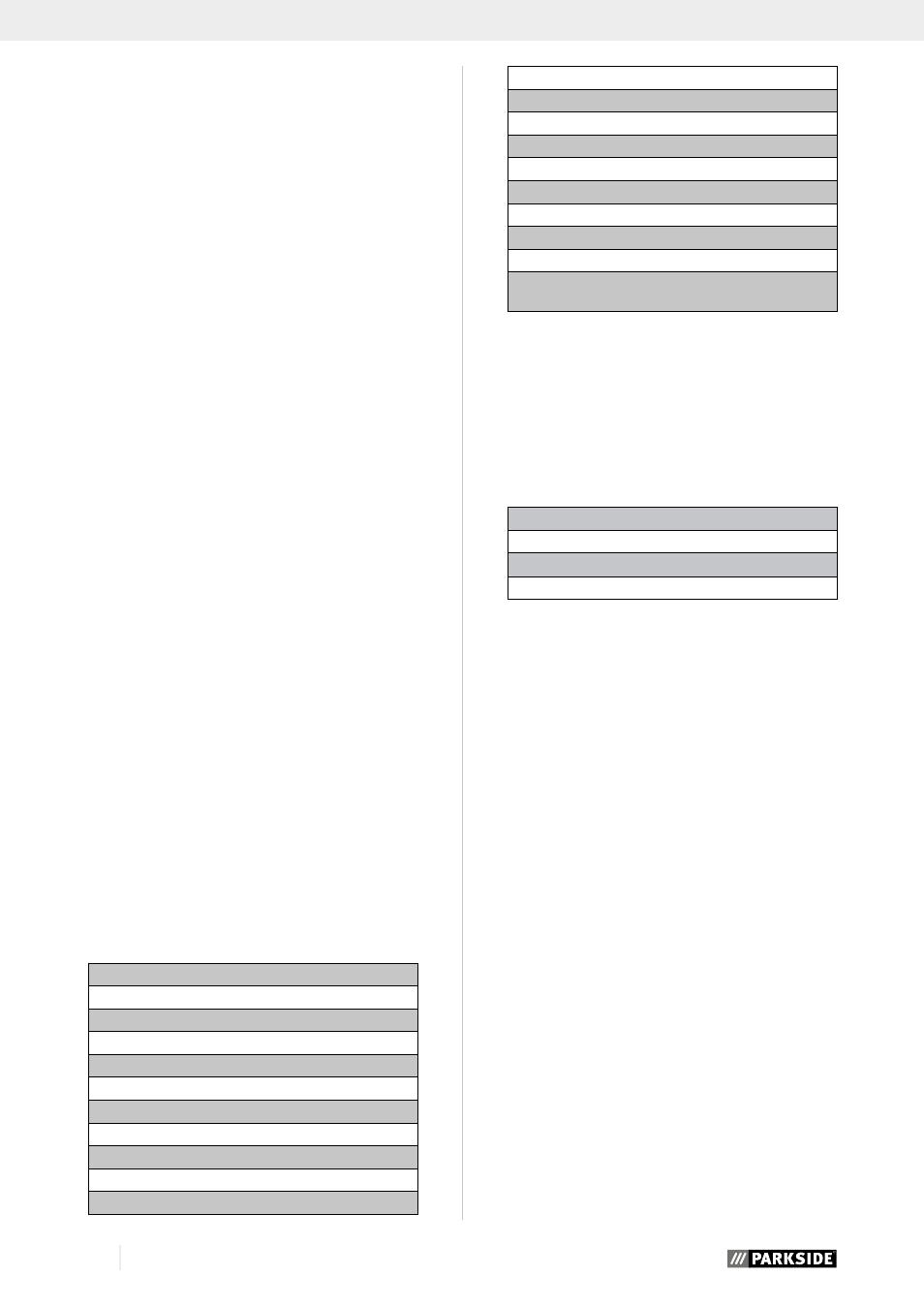Residual risks, Technical data, Noise values – Parkside PTK 2000 A1 User Manual
Page 15: Before starting the equipment, Attachment

10
GB
12
Keep batteries out of the reach of children.
13
Do not allow children to replace batteries without
supervision!
14
Do not keep batteries near fire, ovens or other
sources of heat. Do not use batteries in direct sun-
light or store them in vehicles in hot weather.
15
Keep unused batteries in the original packaging and
keep them away from metal objects. Do not mix
unpacked batteries or toss them together! This can
lead to a short-circuit of the battery and thus dam-
age, burns or even the risk of fire.
16
Remove batteries from the equipment when it will
not be used for an extended period of time, unless
it is for emergencies!
17
NEVER handle batteries that have leaked without
appropriate protection. If the leaked fluid comes into
contact with your skin, the skin in this area should be
rinsed off under running water immediately. Always
prevent the fluid from coming into contact with the
eyes and mouth. In the event of contact, please seek
immediate medical attention.
18
Clean the battery contacts and corresponding con-
tacts in the device prior to inserting the batteries:
Residual risks
The machine has been built according to the state of
the art and the recognised technical safety require-
ments. However, individual residual risks can arise
during operation.
• Health hazard due to electrical power, with the use of
improper electrical connection cables.
• Furthermore, despite all precautions having been met,
some non-obvious residual risks may still remain.
• Residual risks can be minimised if the „safety instruc-
tions“ and the „Proper use“ are observed along with
the whole of the operating instructions.
• Do not load the machine unnecessarily: excessive
pressure when sawing will quickly damage the saw
blade, which results in reduced output of the machine
in the processing and in cut precision.
• When cutting plastic material, please always use
clamps: the parts which should be cut must always
be fixed between the clamps.
• Avoid accidental starting of the machine: the oper-
ating button may not be pressed when inserting the
plug in an outlet.
• Use the tool that is recommended in this manual. In
doing so, your saw provides optimal performance.
• Hands may never enter the processing zone when the
machine is in operation. Release the handle button
and switch off the machine prior to any operations.
• Prior to any adjustment, maintenance or service work
disconnect the mains power plug!
6. Technical data
AC motor 230 V~ 50Hz
performance
2000 Watt
operating mode
S6 40%*
Idle speed
4800 min
-1
Hard-metal blade ø 254 x ø 30 x 2,8 mm
Number of teeth
24 / 48
Thickness riving knife
2,5 mm
minimum size work piece wxlxh 10x50x1 mm
table size 630 x 445 mm
Table width extension left/rights 620 x 250 mm
Table length extension rear
435 x 320 mm
Cutting height max. 90°
73 mm
Cutting height max. 45°
63 mm
height adjustment
0 - 73 mm
saw blade swivel
0 - 45°
suction port
ø 34 mm
weight
28,5 kg
Laser class
2
Wavelength of laser
650 nm
Laser output
< 1 mW
Laser module power supply
2 x 1,5 V
Micro (AAA)
* operating mode S6 40%: Continuous operation with in-
termittent loading (playing time 10 min).
Engine protection of to hot warming up:
It´s allowed to run the engine with nominal power maximum
40% of playing time. After this the machine must run 60% of
playing time steadily without load.
Noise values
The total noise values determined in accordance with
EN 61029.
sound pressure level L
pA
96,2 dB(A)
uncertainty K
pA
3 dB
sound power level L
WA
109,2 dB(A)
uncertainty K
WA
3 dB
Wear hearing protection.
The effects of noise can cause a loss of hearing. Total
vibration values (vector sum - three directions) deter-
mined in accordance with EN 61029.
7. Before starting the equipment
• The equipment must be set up where it can stand
securely, i.e. it should be bolted to a workbench, a
universal base frame or similar.
• All covers and safety devices have to be properly fit-
ted before the equipment is switched on.
• It must be possible for the blade to run freely.
• When working with wood that has been processed
before, watch out for foreign bodies such as nails or
screws, etc.
• Before you press the ON/OFF switch check that the
saw blade is fitted correctly. Moving parts must run
smoothly.
• Before you connect the equipment to the power sup-
ply make sure the data on the rating plate are dentical
to the mains data.
• Connect the machine to a properly installed protec-
tive contact socket, with at least 16A circuit breaker.
8. Attachment
Important. Pull out the power plug before carrying
out any maintenance, resetting or assembly work on
the circular saw!
Place all parts supplied on a flat surface. Grouping
equal parts.
Note: If compounds with a bolt (round head / or hexa-
gon), hex nuts and washers are backed up, the washer
must be fitted under the nut.